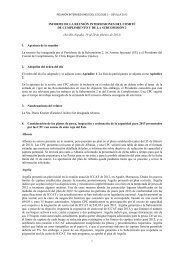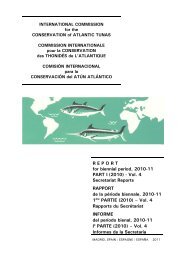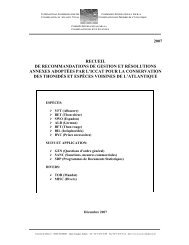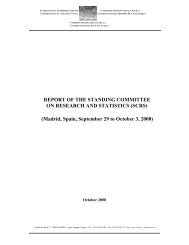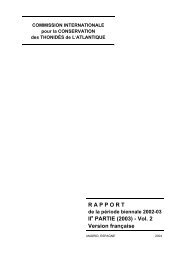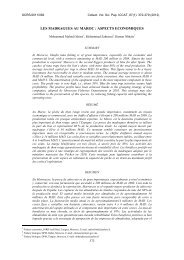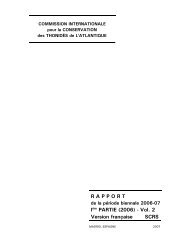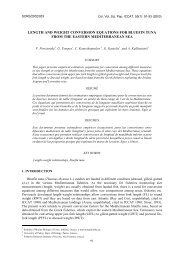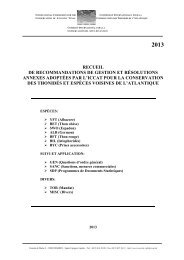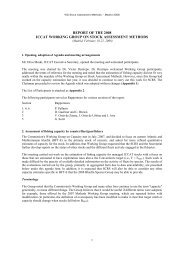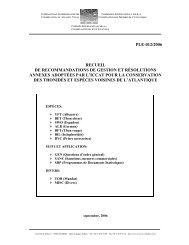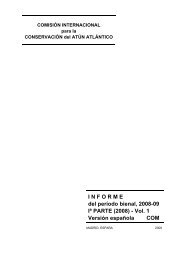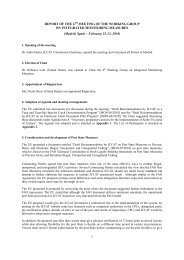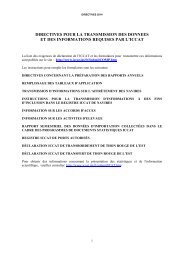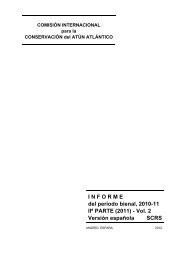E - Iccat
E - Iccat
E - Iccat
You also want an ePaper? Increase the reach of your titles
YUMPU automatically turns print PDFs into web optimized ePapers that Google loves.
ICCAT REPORT 2012-2013 (I)<br />
Working Group emphasized that transparency was a key element of the decision-making process. Some<br />
delegations strongly supported Norway’s proposal to enshrine the concept in the Convention, while some other<br />
delegations emphasized that ICCAT could take other steps to improve transparency and full participation<br />
without a Convention amendment.<br />
ii) Allocation of fishing possibilities<br />
Turkey presented its proposal on fishing allocation, attached as Appendix 10 to ANNEX 4.2, to task the SCRS<br />
to develop a mathematical formula to implement the current ICCAT allocation criteria [Ref. 01-25]. While some<br />
delegations supported the idea of developing a formula to weight the allocation criteria, there were a range of<br />
views about whether the SCRS would be the appropriate body to do so. Other delegations noted that the criteria<br />
were intended to be applied on a Panel by Panel, and stock by stock basis, and that it may not be possible to<br />
develop such a formula. However, the Working Group agreed that ICCAT should improve the clarity and<br />
transparency of how the ICCAT allocation criteria were applied by Panels in developing conservation and<br />
management measures. CPCs noted that there was a fundamental relationship between fair application of the<br />
criteria and transparency and inclusivity in decision-making.<br />
iii) Panel structure<br />
It was recalled that the proposal presented by STACFAD in 2011 (i.e., to redistribute the species among the four<br />
Panels or to add a fifth Panel) did not reach a consensus during the annual meeting. The Working Group<br />
recommended that STACFAD consider the issue further at the forthcoming annual meeting as well as<br />
determining the most appropriate body to develop measures related to non-commercial species and by-catches<br />
that may be of interest to all ICCAT CPCs.<br />
iv) Streamlining / simplifying conservation measures<br />
The Working Group agreed on the importance and the need to streamline the work of the Commission.<br />
Delegates discussed the different possibilities to improve the drafting of the Recommendations and also<br />
reviewed the document “ICCAT Reporting Requirements Review” prepared by the Compliance Committee<br />
Chair in 2011 (attached as Appendix 11 to ANNEX 4.2). The Working Group considered a number of actions<br />
CPCs could take to address this, including: respect the deadlines for the presentation of proposals, avoid<br />
presenting Recommendations with similar issues, eliminate redundancy in texts adopted, ensure consistency<br />
among Recommendations, reduce the number of Recommendations, and adopt a standard format for<br />
proposed recommendations. The Working Group recommended that the Panels review the “ICCAT Reporting<br />
Requirements” and identify further ways to streamline requirements.<br />
v) Election of Chairs<br />
The Working Group considered means to clarify the process for selection of chairs of the Commission and its<br />
subsidiary bodies. Some delegations suggested establishing a geographical distribution of the mandate so as to<br />
ensure equitable and fair rotation. The Working Group took note of the differences between the provisions in the<br />
Convention and the Rules of Procedure regarding the rules for re-election of the Chair and Vice-Chairs of the<br />
Commission and supported consideration of ways to ensure these provisions were consistent with each other and<br />
with current practice.<br />
5. Other issues to strengthen the Commission<br />
5.a Monitoring, Control and Surveillance (MCS)<br />
In their document with several proposals for the meeting, the United States considered that MCS provisions<br />
should be updated in the Convention. Most participants agreed that any future Convention amendment process<br />
should include language on MCS that would reflect the goals of MCS programs but not prescribe specific tools.<br />
The Working Group noted the extensive ICCAT MCS tools already in place and agreed this work should<br />
continue.<br />
5.b Force majeure<br />
Libya presented the document “Issues for discussion by the Working Group on the future of ICCAT”. Based on<br />
its experience during the 2011 bluefin tuna fishing season, Libya proposed including the principle of force<br />
106



